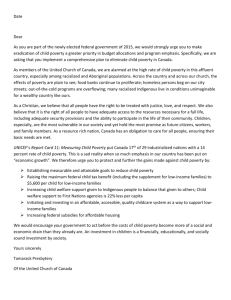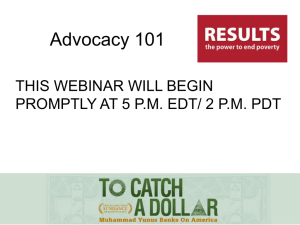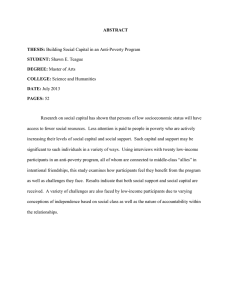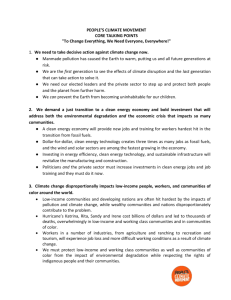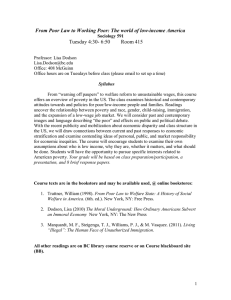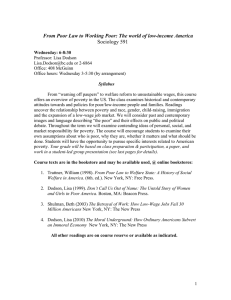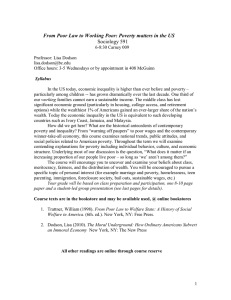Graduate Seminar on Poverty (Sc. 734) Professor Lisa Dodson McGuinn 408.
advertisement
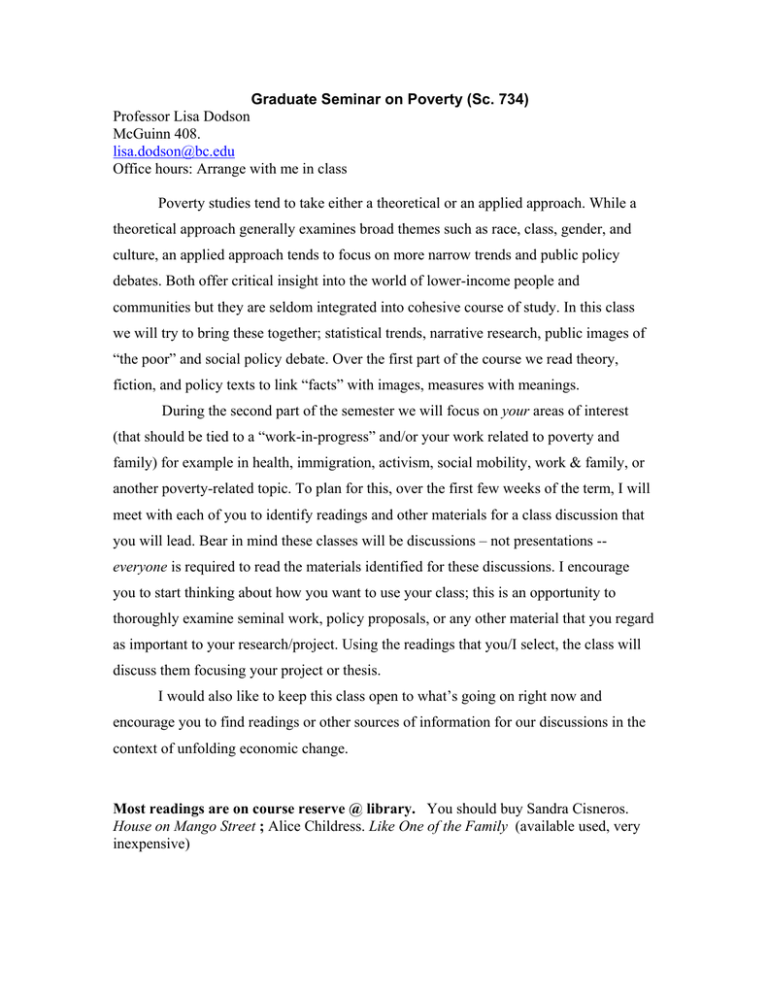
Graduate Seminar on Poverty (Sc. 734) Professor Lisa Dodson McGuinn 408. lisa.dodson@bc.edu Office hours: Arrange with me in class Poverty studies tend to take either a theoretical or an applied approach. While a theoretical approach generally examines broad themes such as race, class, gender, and culture, an applied approach tends to focus on more narrow trends and public policy debates. Both offer critical insight into the world of lower-income people and communities but they are seldom integrated into cohesive course of study. In this class we will try to bring these together; statistical trends, narrative research, public images of “the poor” and social policy debate. Over the first part of the course we read theory, fiction, and policy texts to link “facts” with images, measures with meanings. During the second part of the semester we will focus on your areas of interest (that should be tied to a “work-in-progress” and/or your work related to poverty and family) for example in health, immigration, activism, social mobility, work & family, or another poverty-related topic. To plan for this, over the first few weeks of the term, I will meet with each of you to identify readings and other materials for a class discussion that you will lead. Bear in mind these classes will be discussions – not presentations -everyone is required to read the materials identified for these discussions. I encourage you to start thinking about how you want to use your class; this is an opportunity to thoroughly examine seminal work, policy proposals, or any other material that you regard as important to your research/project. Using the readings that you/I select, the class will discuss them focusing your project or thesis. I would also like to keep this class open to what’s going on right now and encourage you to find readings or other sources of information for our discussions in the context of unfolding economic change. Most readings are on course reserve @ library. You should buy Sandra Cisneros. House on Mango Street ; Alice Childress. Like One of the Family (available used, very inexpensive) Class 1: January 20th Overview: Changing times and low-income America Outline of class, expectations, your topics, course goals, your suggestions. Introductions and brief discussion of our interests/concern about poverty; our current focus of study or research; and – for those who wish – bring up a quandary you face in your research or anticipate you may face in the future, relative to your work. Let’s also be sure we identify policy areas and proposals coming out of the Obama administration that we want to examine and consider the discourse now that “economic suffering” has spread into much of the middle class. We will also discuss Randy Albelda’s op ed on bias in the job corps proposed. http://www.boston.com/bostonglobe/editorial_opinion/oped/articles/2008/11/28/the_macho_stimulus_plan?m ode=PF I will review some trends in low-income America. Class 2: January 27th The “character” debate: Talk about low-income people Race, gender, culture and national heritage are all infused in how mainstream society and public policy makers view and treat low-income people. Let’s talk about crossing-cutting “character talk” about low-income people such as being more violent, engaging in nonnormative sex and reproduction; being “dependency” and other images specifically that influence policies and programs. Readings Alex Lichtenstein. 1988. '”That disposition to theft with which they have been branded” Moral economy, Slave management, and the Law. Journal of Social History Vol. 21, No. 3 (Spring, 1988), pp. 413-440 Nancy Fraser and Linda Gordon. “Genealogy of Dependency: Tracing a Keyword of US Welfare State. Fraser and Gordon. 1994. Signs 19. Anna Ortiz & Laura Briggs. 2003. Social Texts. Vol. 21, No. 3: 40-57. “The culture of poverty, crack babies, and welfare cheaters.” Sudhir Venkatesh. 2006. Off the Books Chapter 4 “The Street Hustler” pages 166-214 (Hand out) Class 3: February 3rd Family life, motherhood and the social reproduction of the good society Mothering and family life have been a major focus of public programs and also of denigrating low-income women, parenting, and family ways. How do low-income women (as far back as peasants and as recent as single working moms) threaten “proper” mothering? What would we say are better policy approaches to support the ability of lowwage moms to move on and take their children with them? Charles Dickens. 1859. Tale of Two Cities. (Any edition) Chapters 15 and 16 Sandra Cisneros. House on Mango Street (all) Dorothy Roberts. 2000-2001. Chicago-Kent Law Journal. Vol. 76:1619-1642. “Kinship care and the price of state support for children.” Lisa Dodson. “Wage-poor mothers and moral economy” We may want to look around for new efforts to promote post-secondary education – the Gates Foundation has launched an initiative and the Civil Rights Project at UCLA hosted a working conference on this last year. Class 4: February 10th The low-wage labor market, services, and carework Sennett, Cobb, Studds Terkel and Lillian Rubin have argued that class is about money and culture. Some argue that “liberal elites” who may take strong stands on gender and race issues, ignore the power of class (some people see it as the heart of the Sarah Palin phenomenon). Richard Sennett and Jonathan Cobb. 1972. The Hidden Injury of Class. Norton Press. Part One (The Sources of Injury) Chapters II “Sacrifice and Betrayal” and III “The Uses of Injured Dignity.” Pages 119-188 Frisch, Michael and Daniel Walkowitz 1983. Working Class America. University of Illinois Press (No chapter numbers!) Catholics, Communists and Republicans. Pages 256283 Alice Childress. Like One of the Family On reserve Class Matters by our own Betsy Leondar-Wright. Class 5: February 17th Black and white, native-born and immigrant workers – pit against each other for poverty wages The debate about immigrants and borders has a deep taproot in debates about race and affirmative action. One set of disadvantaged workers is set on another. And now, this is tied to global forces setting one nation of exploited workers against others. Jones, Jacqueline. 1998. American Work. Norton Press. Chapter 12. “Industrial Devolution and the Persistence of Race.” 369-383 Lou Dobbs (single author book). 2006. War on the Middle Class. Viking Press. Chapter 8, “Broken Borders” 131-156. Ansley, Frances. 2008 Immigration Policy: Who Belongs? Cornell International Law Journal. Winter. 41 Byron L. Dorgan (single author book) 2006. Take this Job and Ship It. St. Martin’s Press. Chapter 3: “Exporting Misery” Pages 45-71 Amanda Tattersall. “Labor Community Coalitions, Global Union Alliances, and the Potential of SEIU’s Global Partnerships. Chapter 8:155-173 in (Editor) Kate Bronfenbrenner 2007. Global Unions. Cornell U Press. Class 6: February 24th Intersecting lives: The border between middle and working poor people Given the large proportion of families in the US today who make unsustainable wages in no-mobility jobs, does the harm spread? Is the middle class affected? And now that middle class is suffering economically, what will happen to efforts to support the advancement of the working poor? Theda Skocpol. 2000. The Missing Middle. Norton Press. Chapter Two “How Americans Forgot the Formula for Successful Social Policy.” 22-58. Weis, Lois. 2008. The Way Class Works. Routledge Press. Jean Anyon. Chapter 13 “Social Class and School Knowledge.” 189-209. Section of Dodson manuscript on economic disobedience. Current news and discussion on the plight of the middle class. March 3rd Holiday – No Class Class 7: March 10th Quiet rebellions and the fruits of inequality. People resist unfairness even when there isn’t an overt movement to point to – such as the labor movement or an Underground Railroad. Where do we find resistance to deep economic inequality that is affecting so many? Would we know it if we saw it? Patricia Ewik and Susan Silby. 1998. The Common Place of Law. Chicago Press. Chapter 6 “Against the Law” 165-220. (Possibly) 2nd part of Dodson manuscript. James Scott (single author book) 1990. Domination and the Arts of Resistance. Chapters 5 & 6: 108-182. Class 8: March 17th Guest speaker Dr. Deborah Connolly Youngblood, Author of Homeless Mothers (I will circulate her book) Deborah is the Vice President of Research and Innovation at the Crittenton Women’s Union (CWU) in Boston. We have entered into a collaboration with CWU to work together on a three-five-year project on Career Family Opportunity for families in a South Boston Housing development. Using an informal format – maybe meet at a local restaurant for dinner -- Deborah will talk about her work and perspectives on researching poverty and we will talk about the vision of the Career Family Opportunity project. Class 9: March 17th The ethics of asking and the risks of telling Alice O Connor, Alice. 2000. “Poverty Research and Policy for Post-Welfare Era.” Annual Review of Sociology. 26:547-562. Additional readings, to be identified. Part Two Classes will be discussions organized by you. March 24th, March 31st April 7th, April 14th, and April 21st. (Note: I have to be out of town on March 24th so we will discuss finding another time.)

